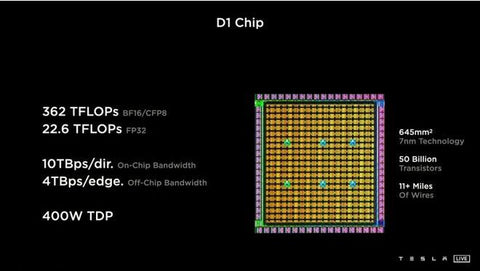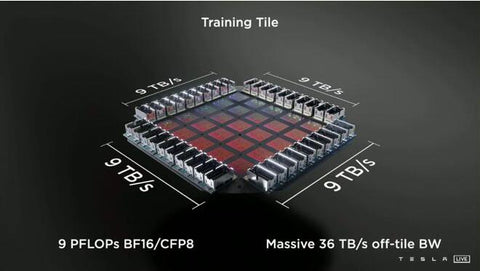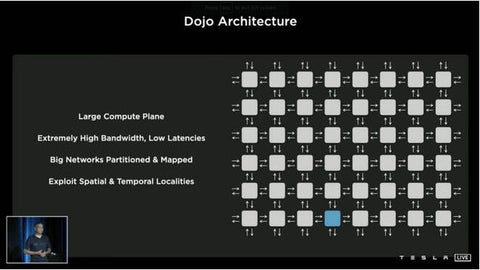Former Tesla Engineer Indicted, Case Pending In U.S. District Court
Recently, Tesla reportedly launched a lawsuit against a former engineer at the company, Alexander Yatskov, alleging that he illegally transferred confidential information about Tesla's Dojo technology to a personal computer and, in order to conceal the relevant evidence, provided a "fake" laptop when the company proposed an inspection. The lawsuit alleges that he unlawfully transferred confidential information about Tesla's Dojo technology to a personal computer, and that he provided a "fake" laptop when the company offered to inspect it in order to hide the evidence.
Tesla's "Dojo Project," which is reportedly in the development stage, is an internal supercomputer used to build self-driving software. It can process large amounts of data, mainly images and video data from Tesla vehicles used for self-driving research and development.
Tesla emphasized that the confidential information that Yatskov illegally downloaded and transferred to his personal computer was design data about heat treatment and other data related to the project, which is highly confidential and closely guarded within Tesla. Moreover, all of the engineers involved in the Dojo project had signed a confidentiality agreement that specifically prohibited them from disclosing or maintaining confidential information related to the Dojo project.
The complaint alleges that Yatskov violated the agreement by copying confidential information from company equipment and accounts, downloading and storing it on his own personal computer, and creating documents on his personal computer containing confidential information about Tesla's Dojo program. And Tesla also said they found that Yatskov sent emails containing confidential Tesla information from his work email account to his personal email address.
Tesla also said that after questioning by the company, Yatskov admitted to the conduct in question, having downloaded confidential Dojo Project information from a company computer to his personal computer.
The suit also alleges that after that, the company asked Yatskov to take a leave of absence starting April 6 and asked him to return the computer so the company could recover the stolen data as soon as possible. However, Yatskov attempted to conceal any evidence against him by submitting a "fake" computer that did not contain any of the stolen information. The "fake" computer contained data about Tesla that was unimportant, such as employment offers.
In its complaint, Tesla seeks damages and exemplary relief from Yatskov, as well as a court order compelling Yatskov to return the confidential information.
According to the complaint, Yatskov resigned on May 2 and refused to respond to Tesla. When contacted by telephone, Yatskov claimed he was unaware of the suit and declined to comment on the matter.
In addition to suing Yatskov for stealing confidential company information, Tesla also accused him in the complaint of misrepresenting his expertise and work experience on his resume. Yatskov joined Tesla in January as a thermal management engineer, responsible for designing cooling systems for supercomputers that generate a lot of heat.
The case is currently pending in the U.S. District Court for the Northern District of California (San Jose), Case No. Tesla Inc. v. Yatskov, 5:22-cv-02725.
The Dojo supercomputer project is highly regarded because of its importance to Tesla's self-driving strategy. Tesla is known to be a car manufacturer, but Tesla CEO Elon Musk has been emphasizing that he "wants people to think of Tesla not as a car manufacturer or an energy company, but as a startup dedicated to developing artificial intelligence and robotics."
Tesla has been unique in sticking to purely visual perception using only cameras, which is a departure from most self-driving companies' strategy of using a combination of LIDAR, radar and cameras as perception.
The Dojo supercomputer, which processes large amounts of video data, is Tesla's "secret weapon" for a camera-only self-driving strategy and is arguably one of the largest experiments in pure computer vision.
Tesla revealed the Dojo supercomputer as early as Autopilot Day 2019 and officially unveiled it at an AI Day at Tesla's headquarters in California on August 19, 2021. That same day, Tesla also announced its D1 chips, with 25 D1 chips in the Dojo supercomputer.

Tesla's D1 chip is a chip designed for artificial intelligence with a BF16/CFP8 computational performance that achieves 362 TFLOP of power. 354 training nodes on the D1 chip form a network of functional units that are interconnected to create a powerful chip. Each functional unit can communicate over the cell network with a bandwidth of up to 512GB/S.
Each functional unit is equipped with a quad-core 64-bit ISA CPU, and each CPU is specially designed for transposition, compilation, etc.

The D1 chip is built on a 7nm process with 50 billion transistors and an area of 645 square millimeters, which means it is smaller than the 826 square millimeter GA100GPU used in the NVIDIA A100 gas pedal.

Dojo, a chip cluster with 25 D1s, is very powerful in terms of computing. Musk said that it is capable of exaFLOP level computing. That would be an incredible amount of computing speed, an exaFLOP super system would have the equivalent of 316,887,65,000 consecutive years of computing if it performed one operation per second.
The power of Dojo's arithmetic allows it to process visual data up to four times faster than existing systems, which Tesla says will allow the company to fully automate its self-driving systems.






























